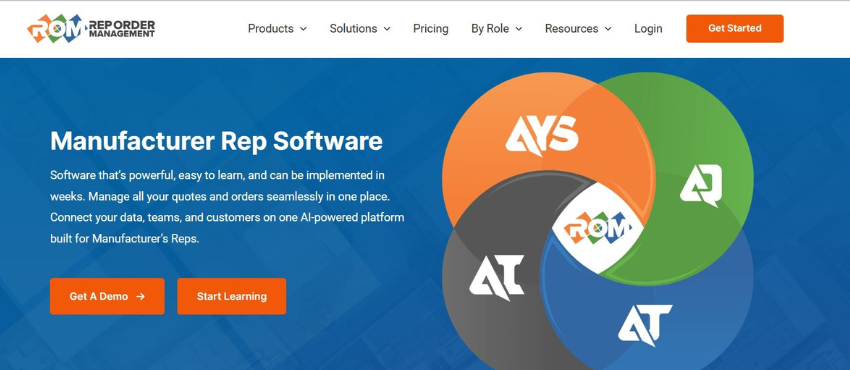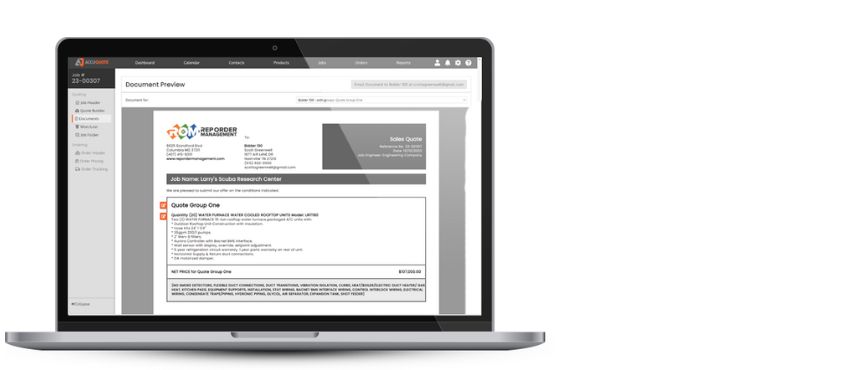Best CRM for Manufacturer Representatives (2025)
Before we delve into the heart of the matter of a CRM for Manufacturer Representatives, it’s essential to understand what a CRM is and why it’s a crucial tool for manufacturers’ representatives. Customer Relationship Management, or CRM, is a technology used to manage all your company’s relationships and interactions with customers and potential customers. It helps you stay connected to them, streamline processes, and improve profitability.
Now, why is this important for manufacturers’ representatives? Let’s find out.
- Best CRM for Manufacturer Representatives (2025)
- Why Manufacturers’ Representatives Need a CRM
- Choosing the Right CRM for Manufacturers’ Representatives
- Key Features of a CRM for Manufacturers’ Representatives
- Benefits of Using a CRM
- Choosing the Right CRM for Your Business
- Why Rep Order Management?
- CRM for Manufacturers’ Reps FAQs
Why Manufacturers’ Representatives Need a CRM
Manufacturers’ representatives, often known as independent sales reps or agents, are unique entities in the business world. They operate on a multi-line model, representing several non-competing manufacturers in a specific territory. This model presents unique challenges that a CRM can help address.

Unique Challenges of Manufacturers’ Representatives
Manufacturers’ representatives juggle multiple product lines, each with its own set of specifications, pricing, and target customers. This complexity can lead to inefficiencies and missed opportunities. Additionally, they often lack direct access to manufacturers’ internal systems, making it difficult to track customer interactions and sales data.
The Power of CRM for Manufacturers’ Representatives
This is where a CRM comes into play. A CRM system can help manufacturers’ representatives manage these challenges effectively. It provides a centralized platform to track all customer interactions, ensuring no detail is missed. It can also integrate with manufacturers’ systems, providing real-time access to product and sales data.
With a CRM, manufacturers’ representatives can:
- Streamline customer interactions across multiple product lines
- Access real-time data to make informed sales decisions
- Improve efficiency and productivity
- Enhance customer satisfaction through personalized interactions
In essence, a CRM is not just a tool; it’s a game-changer for manufacturers’ representatives.

Choosing the Right CRM for Manufacturers’ Representatives
Now that we understand the importance of a CRM for manufacturers’ representatives, the question arises – how do you choose the right one? This is what we aim to answer in this comprehensive guide. We’ll explore the key features to look for, the benefits of a tailored CRM, and how to implement it effectively.
Stay tuned as we delve deeper into the world of CRM for manufacturers’ representatives, providing you with the knowledge and tools to make the right choice for your business.

Key Features of a CRM for Manufacturers’ Representatives
When it comes to choosing a CRM for manufacturers’ representatives, there are several key features that can make a significant difference in managing your business operations. Let’s explore some of these essential features:
Sales Tracking and Management
Sales tracking is a crucial feature that allows you to monitor the sales process from start to finish. It helps you keep track of all your sales activities, including customer interactions, follow-ups, and deal closures. This feature provides you with a clear view of your sales pipeline, enabling you to make informed decisions and strategies.
Accurate Quoting
When it comes to quoting, a CRM for manufacturers’ representatives should offer robust features that streamline and enhance this critical process. The key features you want to keep an eye out for include — quoting automation, which allows you to generate quotes quickly and accurately, a comprehensive quote history, real-time updates allowing you to update specs, cost, and markup in one centralized template, a bid calendar, and fully integrated sales orders, allowing you to generate sales orders with no rekeying.
Commission Tracking and Management
Elevate your business’s financial clarity with our advanced Commission Tracking and Management feature. Dive into customizable commission structures tailored to meet the diverse needs of your sales force. Experience real-time commission visibility, ensuring transparency and motivation across your team. Utilize our easy reporting and reconciliation tools for accurate and timely payouts, eradicating discrepancies and fostering trust. Embrace efficiency and precision in managing your commissions, propelling your team towards greater success.
Customer Relationship Management (CRM)
At its core, a CRM is all about managing customer relationships. It should provide you with tools to manage all your customer interactions, from initial contact to after-sales service. This includes tracking customer preferences, purchase history, and communication history. A good CRM will help you build strong, long-lasting relationships with your customers.
Equipment Shipment Tracking
Enhance operational efficiency with our Equipment Shipment Tracking feature. Gain real-time visibility of all shipments, ensuring you’re always in the loop with up-to-the-minute tracking details. Our system sends automated notifications at critical milestones, such as dispatch and delivery, keeping you informed every step of the way. Plus, integration with carrier systems streamlines tracking, making the entire shipping process seamless and hassle-free. Stay ahead with precise, timely updates, and elevate your logistical operations to new heights.
Task Management and Collaboration
A CRM should also include a task management feature. This allows you to assign tasks to your team members, set deadlines, and track progress. It ensures that everyone is on the same page and that no task falls through the cracks, significantly improving your team’s productivity and efficiency.
Reporting and Analytics
Data is the lifeblood of any business, and a CRM should provide you with tools to analyze this data effectively. A reporting and analytics feature can help you track key metrics, identify trends, and generate detailed reports. This can provide you with valuable insights into your business operations, helping you make data-driven decisions.
Mobile Access
Transform the way you work with our Mobile Access feature. Enjoy comprehensive access to CRM data and functionalities directly from your mobile devices, ensuring your business moves with you. Your work doesn’t have to stop, even when you’re on the go. Benefit from mobile app features designed for real-time updates and seamless communication, keeping you connected and informed no matter where you are.
A CRM is not just about managing customer relationships. It’s a comprehensive tool that can help you manage all aspects of your business operations, from sales tracking to task management to data analysis. When choosing a CRM, consider these key features to find the one that best fits your needs.

Benefits of Using a CRM
Using a CRM comes with a host of benefits that can significantly improve your business operations and bottom line. Here are some of the key benefits:
Increased Sales
A CRM can help you increase your sales by providing you with tools to manage your sales process more effectively. For instance, RepOrderManagement, a CRM designed specifically for manufacturers’ representatives, has helped its clients quote more than $2.1 billion and save over 50,000 hours.
Improved Customer Relationships
A CRM can help you improve your customer relationships by providing you with a centralized platform to manage all your customer interactions. This ensures that no detail is missed and that you can provide personalized service to each customer. For example, REA Incorporated, a client of RepOrderManagement, reported experiencing better visibility for their project opportunities and reducing the amount of time to develop a proposal.
More Efficient Data Management
A CRM can help you manage your data more efficiently by providing you with a centralized platform to store and access all your data. This includes customer data, sales data, and commission data. For instance, United Energy Products, another client of RepOrderManagement, found the CRM key to their sales and estimating operations, allowing them to bid quickly and accurately.
In conclusion, a CRM is not just a tool; it’s an essential partner in your business operations. It can help you manage your unique challenges as a manufacturers’ representative, improve your sales and customer relationships, and manage your data more efficiently.

Choosing the Right CRM for Your Business
Selecting the right CRM for your business is a critical decision that can significantly impact your operations and bottom line. Here are some tips to help you make the right choice:
Consider Your Specific Needs
Every business is unique, and so are its needs. Consider the specific challenges and requirements of your business. Do you need a CRM that can handle multiple product lines? Do you need robust equipment shipment tracking? Understanding your needs can help you choose a CRM that fits your business like a glove.
Evaluate the CRM’s Features
As we’ve discussed, a good CRM should have features like sales tracking, commission tracking, customer relationship management, task management, and reporting and analytics. Make sure to evaluate these features in any CRM you’re considering.
Importance of Mobile Access
In today’s fast-paced world, having access to your CRM on the go is crucial. Make sure the CRM you choose offers mobile access, allowing you to stay connected to your business at all times.
Why Rep Order Management?
One CRM platform that checks all these boxes is Rep Order Management (ROM). Designed specifically for manufacturers’ representatives, we offer a host of features tailored to your unique needs. In conclusion, a CRM is more than just a tool; it’s a partner in your business operations.
It can help you manage your unique challenges as a manufacturers’ representative, improve your sales and customer relationships, and manage your data more efficiently. Whether it’s sales tracking, commission tracking, or equipment shipment tracking, a good CRM has got you covered.
Take Action Now
Don’t miss out on optimizing your sales processes. Request a demo today and witness firsthand the transformative impact Rep Order Management can have on your operations.
CRM for Manufacturers’ Reps FAQs
A CRM (Customer Relationship Management) for manufacturers’ representatives is a specialized tool designed to manage all customer interactions, sales tracking, commission tracking, and other business operations specific to manufacturers’ representatives. It helps streamline processes, improve profitability, and enhance customer satisfaction.
Manufacturers’ representatives often juggle multiple product lines, each with its own set of specifications, pricing, and target customers. A CRM helps manage these complexities by providing a centralized platform to track all customer interactions and integrate with manufacturers’ systems for real-time access to product and sales data.
Key features to look for in a CRM for manufacturers’ representatives include sales tracking, commission tracking, customer relationship management, task management, reporting and analytics, equipment shipment tracking, mobile access, and integration capabilities.
A CRM can increase sales by providing tools to manage the sales process effectively. It can improve customer relationships by offering a centralized platform to manage all customer interactions. A CRM can also manage data more efficiently, providing a centralized platform to store and access all your data, including customer data, sales data, and commission data.
Consider your specific needs, evaluate the CRM’s features, check its integration capabilities, and ensure it offers mobile access. One CRM platform that is specifically designed for manufacturers’ representatives and offers a host of tailored features is Rep Order Management (ROM).

